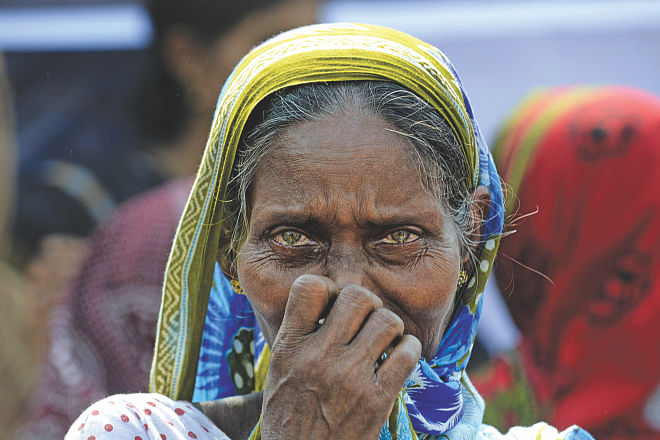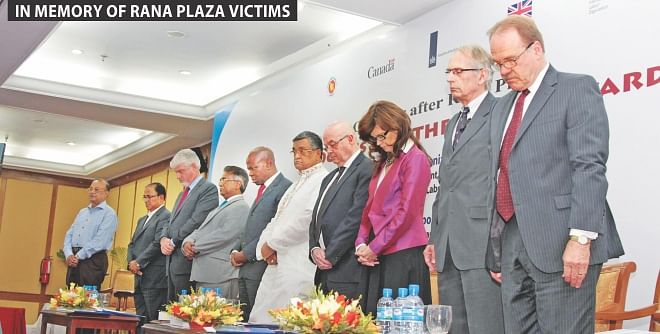SHAME!

Even a year after the Rana Plaza disaster, the families of dead workers and survivors are yet to get adequate compensation, with a top ILO official terming the delay a shame for all stakeholders.
"It is very hard, very difficult to speak here today and say that the victims still cannot be adequately compensated. That will be a shame for all of us," said Gilbert Fossoun Houngbo, ILO's deputy director general for field operations and partnerships, yesterday.
He also said a lot has been done but more remains to be done to ensure better working conditions in the RMG sector.
The ILO official's comments came at a discussion on progress in ensuring factory and workplace safety since the deadly Rana Plaza collapse on April 24 last year left at least 1,135 workers dead and over 2,400 injured.
The labour and employment ministry and International Labour Organisation (ILO) jointly arranged the programme, attended by diplomats from Europe and America, labour leaders and rights campaigners, at Ruposhi Bangla Hotel in the capital.
"We call for rapid and full compensation to the victims under coordinated approach," said William Hanna, ambassador and head of delegation of European Union to Bangladesh.
The Rana Plaza incident has to be a turning point in addressing labour issues, he said, adding that unsafe workplaces must be abandoned.
Hanna also said the European Union, being the biggest importer of Bangladeshi garments, has a special responsibility to act. The EU is ready to assist but Bangladesh also has to take its responsibility.
"We will stay engaged. We expect you to be engaged," he said. "Let's not talk about conspiracies. Let us talk about working together to safeguard workers' lives, safeguard the industry."
US envoy Dan W Mozena said it's time to recommit to ensure that Bangladesh will never again experience anguish like the Rana Plaza building collapse.
Md Zafrul Hasan, chairperson of National Coordination Committee for Workers' Education, said compensation should not be paid in phases. "It should be paid in one go so that workers can do something [with it] for their life."
The worst-ever apparel industry disaster, which took place less than five months after 112 workers died in the Tazreen Fashions fire, led to a huge outcry at home and abroad over poor safety and working conditions in the RMG sector.

Since then, various initiatives, including inspecting 1,055 factories, upgrading factory inspection offices and hiring more inspectors, were taken to improve labour standards in the $20 billion export earning industry.
Of the factories, 16 were temporarily closed due to safety risks, said Labour and Employment Secretary Mikail Shipar at the discussion.
He noted the government had amended labour laws, making safety measures mandatory and relaxing rules to enable the formation of trade unions in garment factories. The cabinet approved the National Occupation and Safety Policy in this regard.
A Rana Plaza Trust Fund, an initiative of the government, buyers, BGMEA, trade unions and NGOs, was also formed to compensate the victims.
However, a total of $15 million has been collected against a target of $40 million under the trust fund.
From the prime minister's relief fund, the government has so far distributed Tk 23.55 crore out of Tk 127 crore raised for the Rana Plaza victims.
"We have seen unprecedented commitments which must be fulfilled," said ILO Country Director Srinivasa Reddy. "We have to continue the momentum, fulfil the commitments and ensure a safer workplace in Bangladesh."
Speaking at the programme, Canadian High Commissioner Heather Cruden said if commitments are not maintained and reforms do not continue, Canadian consumers will demand buyers source elsewhere.
She stressed the need for coordination for continuation of reforms.
Gerben Sjoerd de Jong, ambassador of the Netherlands, said the Rana Plaza disaster underlined the pressing need for significant reforms in the RMG sector worldwide as well as in Bangladesh.
Many initiatives toward reforms have been taken, he said. However, compensating victims is one important job that needs to be done.
British High Commissioner Robert W Gibson praised Bangladesh's RMG sector and said, "It remains vital to poverty reduction, economic empowerment of women. We want to see the RMG sector of Bangladesh thrive and prosper safely and not at the expense of human lives.
"I disagree with those who see conspiracies and claim we are creating a labour crisis... We are not. What we are trying to do is help improve and develop a vital industry."
Roy Ramesh Chandra, secretary general of IndustriAll Bangladesh, said, "Compensation is a right, not charity." He said a lot of seminars, symposiums and workshops are being held, but families of deceased workers and survivors are still suffering.
Brands have failed to continue their contributions for compensation to the victims till today, he said. The 29 brands that sourced from Rana Plaza have a combined annual profit of $22 billion. Only 0.2 percent of their profit makes the $40 million targeted for the Rana Plaza Trust Fund.
Bangladesh Garment Manufacturers and Exporters Association (BGMEA) President Md Atiqul Islam said the industry needs time to improve safety standards in factories as huge investment is required.
"This is a real challenge for us," he said, adding that the trade body has taken a “zero-tolerance” approach for building safety. He called upon apparel brands to pay better prices to help improve labour conditions.
Expatriates' Welfare and Overseas Employment Minister Khandker Mosharraf Hossain also spoke on the occasion.

 For all latest news, follow The Daily Star's Google News channel.
For all latest news, follow The Daily Star's Google News channel. 



Comments